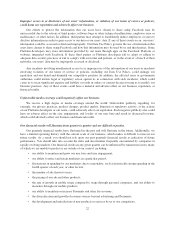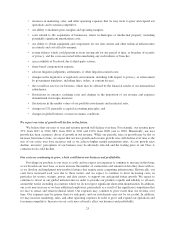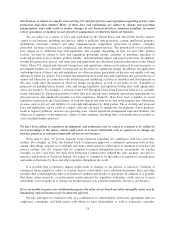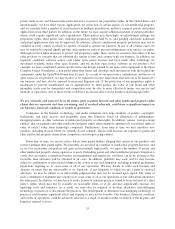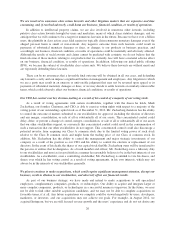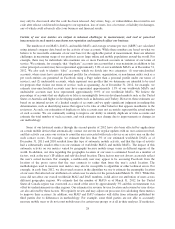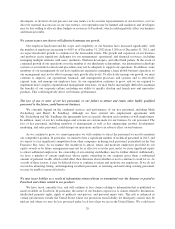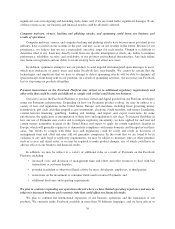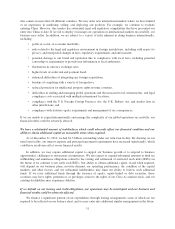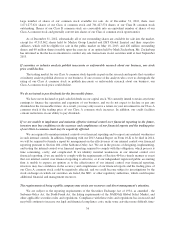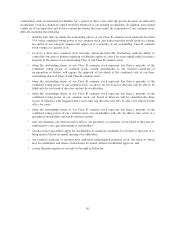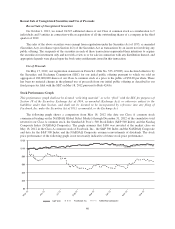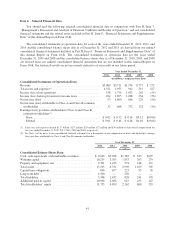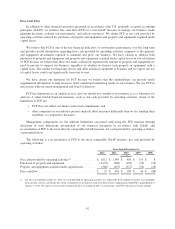Facebook 2012 Annual Report Download - page 36
Download and view the complete annual report
Please find page 36 of the 2012 Facebook annual report below. You can navigate through the pages in the report by either clicking on the pages listed below, or by using the keyword search tool below to find specific information within the annual report.In particular, we have used these types of arrangements to finance some of our equipment and data centers. In
addition, we have a revolving credit facility that we may draw upon to finance our operations or other corporate
purposes, and have a term loan facility, from which we drew $1.5 billion to fund a portion of our tax withholding
and remittance obligations in connection with the settlement of RSUs. If we default on these leasing and credit
obligations, our leasing partners and lenders may, among other things:
• require repayment of any outstanding lease obligations or amounts drawn on our credit facilities;
• terminate our leasing arrangements and credit facilities;
• terminate our access to the leased data centers we utilize;
• stop delivery of ordered equipment;
• sell or require us to return our leased equipment; or
• require us to pay significant damages.
If some or all of these events were to occur, our operations may be interrupted and our ability to fund our
operations or obligations, as well as our business, financial results, and financial condition, could be adversely
affected.
We may have exposure to greater than anticipated tax liabilities.
Our income tax obligations are based in part on our corporate operating structure and intercompany
arrangements, including the manner in which we develop, value, and use our intellectual property and the
valuations of our intercompany transactions. The tax laws applicable to our business, including the laws of the
United States and other jurisdictions, are subject to interpretation. The taxing authorities of the jurisdictions in
which we operate may challenge our methodologies for valuing developed technology or intercompany
arrangements, which could increase our worldwide effective tax rate and harm our financial position and results
of operations. We are subject to regular review and audit by U.S. federal and state and foreign tax authorities.
Tax authorities may disagree with certain positions we have taken and any adverse outcome of such a review or
audit could have a negative effect on our financial position and results of operations. In addition, the
determination of our worldwide provision for income taxes and other tax liabilities requires significant judgment
by management, and there are many transactions where the ultimate tax determination is uncertain. Although we
believe that our estimates are reasonable, the ultimate tax outcome may differ from the amounts recorded in our
financial statements and may materially affect our financial results in the period or periods for which such
determination is made. In addition, our future income taxes could be adversely affected by earnings being lower
than anticipated in jurisdictions that have lower statutory tax rates and higher than anticipated in jurisdictions that
have higher statutory tax rates, by changes in the valuation of our deferred tax assets and liabilities, or by
changes in tax laws, regulations, or accounting principles. For example, we have previously incurred losses in
certain international subsidiaries that resulted in an effective tax rate that is significantly higher than the statutory
tax rate in the United States and this could continue to happen in the future.
Changes in tax laws or tax rulings could materially affect our financial position and results of operations.
Changes in tax laws or tax rulings could materially affect our financial position and results of operations.
For example, the current U.S. administration and key members of Congress have made public statements
indicating that international tax is a priority. Certain changes to U.S. tax laws, including limitations on the ability
to defer U.S. taxation on earnings outside of the United States until those earnings are repatriated to the United
States, could affect the tax treatment of our foreign earnings. In addition, other countries are considering changes
to their tax regimes in an effort to raise additional tax proceeds from companies such as Facebook. Due to the
large and expanding scale of our international business activities, any changes in the taxation of such activities
may increase our worldwide effective tax rate and harm our financial position and results of operations.
32


